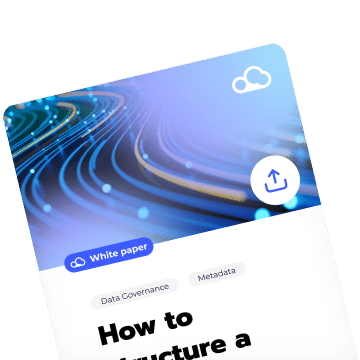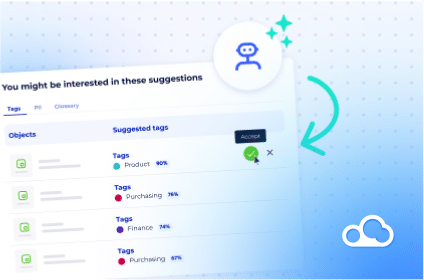As we explained in 5 Compelling Reasons Chief Data and Analytics Officers are Moving to Data Mesh, enterprise agility is critical to business success in today’s fast-changing world. This has given rise to the shift to decentralized authority and accountability for business objectives. The creation of the self-service data platform has empowered autonomous domain teams to find the information they need to accelerate decision-making using data mesh.
What is a self-service data platform?
A self-serve data platform is a set of capabilities that enable domain teams to create and consume data products without relying on centralized IT and data teams. While there are common technical capabilities across domain teams, a self-service data platform enables teams to select and combine capabilities to meet their specific requirements easily. This requires balancing the need for standardized capabilities with the need for flexibility in selecting capabilities that best support data product developers and consumers within domain teams.
Building blocks of a self-service data platform
The design of a self-serve data platform within a data mesh architecture revolves around four key building blocks:
- Creating data products: This block focuses on enabling domain teams to build and evolve their data products. It includes data landing zones and the tools to ingest data from multiple sources, and capabilities to model, transform, integrate, cleanse, and validate data. It also provides storage for curated data sets and data products and tools for building interfaces to access those data products.
- Describing data products: A common language and framework for defining data products enables a global understanding and interoperability between data products. It includes capabilities like business glossaries, metadata management, and domain models that describe the structure and semantics of data products. It also provides documentation of the interfaces and communication protocols that enable the consumption of data products.
- Governing data products: This focuses on ensuring data integrity, security, and compliant use of data products. It includes policy and rule management for things like access control, quality monitoring, and privacy regulations. Governing data products provides the capabilities to classify and label sensitive information workflow for approval, cataloging, versioning of data products, documentation of terms and conditions of use through data contracts.
- Consuming data products: Discoverability and ease of access are foundational for a self-service. Capabilities like cataloging and search, business glossaries, and data lineage make data products easy to find and increase trust in and understanding the data products. Well-document interfaces simplify provision of the data products for use.
Self-Service data platform implementation challenges
The data mesh principle of decentralized domain ownership doesn’t mean domain teams should have absolute freedom to choose their tools for self-serve data platform capabilities. Allowing each domain team to choose their own capabilities significantly increases the overall complexity of the data mesh architecture. This lack of standardization presents several challenges, including:
- Inefficient resource allocation: Allowing teams to choose capabilities independently can result in inefficient resource allocation and duplication of efforts. Multiple teams might end up buying/building similar capabilities or solving the same problems independently, leading to redundant work and wasted resources. It can also be challenging to identify shared needs and opportunities for collaboration, resulting in suboptimal resource utilization.
- Lack of expertise and specialization: Domain teams may not have the necessary expertise or specialization to choose and implement the most suitable capabilities for their specific needs. They may not provide a holistic view of the organization’s data ecosystem or the broader implications of their choices, leading to sub-optimal or inadequate capabilities being selected, impacting overall system performance and efficiency. This can also increase the learning curve for new team members who must navigate through a variety of capabilities.
- Data silos: Unrestricted capability selection can potentially result in the creation of data silos within the organization. If each domain team chooses its own technologies and approaches without considering interoperability or data sharing, it becomes challenging to integrate and share data across different domains. Data silos hinder collaboration, cross-domain analysis, and the organization’s ability to derive insights from a holistic view of the data.
- Increased maintenance burden: With a wide range of capabilities chosen by different teams, the maintenance burden of the overall system can increase significantly. Each capability requires ongoing support, updates, and bug fixes, which can strain resources and slow the pace of innovation. It can be challenging to ensure that all capabilities remain up-to-date and compatible as the organization’s needs evolve.
Self-service data platform implementation best practices
To mitigate the challenges described above, it is important to find a balance between domain team autonomy and centralized standardization. Let’s look at some best practices for capability selection and avoiding unnecessary duplication.
- Define core capabilities: Identify the core capabilities that should be standardized across the self-serve data platform. These capabilities may include data cataloging, data provisioning, data quality, data observability, data governance, data security, and more.
- Create a capability framework: Develop a capability framework that outlines the standardized capabilities and their associated components, processes, and requirements. This framework serves as a reference guide for teams to understand and implement the necessary capabilities within their respective domains.
- Engage domain teams: Engage with domain teams and involve them in defining and refining the requirements for standardized capabilities. This collaboration helps ensure that the capabilities align with the specific needs and context of different domains.
- Provide deployment guidelines: Develop guidelines and templates that demonstrate how to implement each standardized capability. These documents should provide clear instructions, address common challenges, highlight dependencies, and recommend accelerating deployment.
- Offer training and support: Ensure documentation and training programs are available to help teams understand how standardized capabilities function. Additionally, it’s important to offer formal and informal support resources such as dedicated forums, Slack channels, or office hours where teams can seek guidance, ask questions, and share knowledge.
- Establish governance mechanisms: Implement policies and procedures to ensure adherence to the standardized capabilities and processes for reviewing and approving non-standard capabilities. This may include establishing a central governance board or community that oversees the platform’s evolution and ensures interoperability.
Conclusion
Implementing a self-serve data platform within a data mesh architecture presents both opportunities and challenges for organizations seeking to empower domain teams with autonomy and accelerate decision-making through data. While the principles of decentralized authority and accountability foster agility and innovation, it is vital to address the challenges that arise from unrestricted capability selection.
By following the best practices outlined above, organizations can mitigate the challenges of implementing a self-serve data platform. A balanced approach enables the creation of a robust, scalable, and agile data ecosystem that doesn’t sacrifice domain team autonomy or cross-domain interoperability. Getting the self-serve data platform right is key to empowering domain teams to make decisions faster to accelerate enterprise success in today’s rapidly changing business landscape.
—
Discover DataGalaxy’s all-in-one self-service platform, The Data Knowledge Catalog! Our robust data catalog offers a user-centric platform dedicated to metadata mapping, management, and knowledge-sharing. Trusted by 130+ leading brands including Dior, Sephora, and TotalEnergies, DataGalaxy helps businesses of all sizes gain control over their data assets and make better, more informed decisions thanks to our innovative approach to data governance and cataloging.





